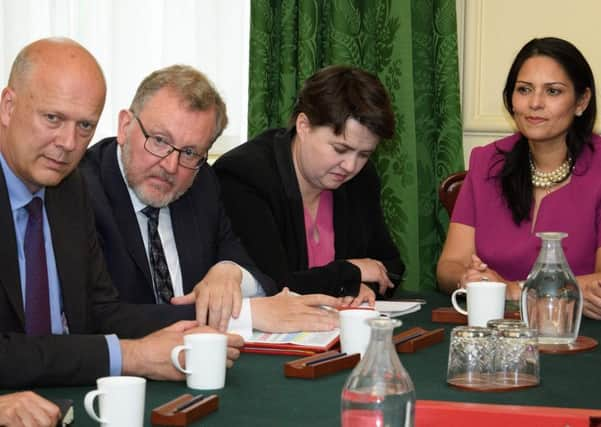Ian Swanson: The real test of the Scots Tory recovery starts now


Without the 13 Conservative MPs elected in Scotland last Thursday that Mrs May would struggle to cling onto power after losing her overall majority in the Commons.
That gives the Scottish block of Tory MPs a serious influence over policy as the Government tries to put together its slimmed-down programme.
Advertisement
Hide AdAdvertisement
Hide AdMs Davidson was in Downing Street on Monday to press the case for a more “open” version of Brexit and making sure any deal with the fundamentalist DUP does not affect gay rights in the rest of the UK.
The Scottish Tory leader is even touted as a possible successor to Mrs May when she quits, as she inevitably must before the next election, whenever that might be.
The Prime Minister told Tory backbenchers on Monday night that she was the one who “got us into this mess” and she would get them out of it. But in public she finds it difficult to acknowledge the scale of her catastrophic political miscalculation in calling an election when she didn’t need to, putting forward controversial social care reforms which would hit her core supporters and instead of the hoped-for landslide ending up with fewer seats than she started while Labour – written off as useless at the start of the campaign – enjoyed an unparallelled revival.
Rather than contrition or compromise, Mrs May carried on mouthing the mantra about “getting on with the job”.
Advertisement
Hide AdAdvertisement
Hide AdBut the Conservative party is brutal towards leaders who fail. The only reason she has not been forced out already is that they fear a leadership contest now would be damaging to the party and could trigger another general election, which they are worried Labour would win.
But Mrs May’s days in Downing Street are clearly numbered. She – and David Cameron before her – put the country through an unnecessary vote in pursuit of their own political purposes, arrogantly assuming victory was assured, but found they had misjudged the mood and must pay the price.
How ironic that it is the party’s recovery in Scotland – for so long almost a Tory-free zone – which has given Mrs May the numbers to cling on for now. But it is worth examining what the recovery was based on.
Ruth Davidson and her colleagues based almost their entire election campaign on one issue: stopping Indyref2.
Advertisement
Hide AdAdvertisement
Hide AdLabour and the Lib Dems also used the issue but it was the Tories who focused most determinedly on it and who reaped the most rewards.
It was the same in last year’s Holyrood elections, when Ms Davidson led her party to its best showing since devolution. The party’s campaign was almost policy-free, but voters were told over and over again that Ms Davidson would provide a strong opposition to the SNP and stand up against a fresh referendum.
If Indyref2 is now taken off the table, the Tories will not stop warning of the danger of the SNP bringing it back in the future, but they will have to talk about other issues too, answer questions on how they would put right the problems in health and education and defend their policies. That will be the test of how real the recovery is.